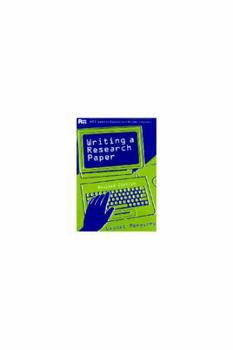Writing a Research Paper, Rev. Ed.
Writing a Research Paper was written to meet the need of advanced ESL students for a research paper guide. The book offers clarity of expression, simplicity of organization, and specific assignments for students to complete a full research paper. This text would suit English composition courses aimed at teaching the writing of research papers to ESL students. It could also be used as a supplementary text in any academic course in which the writing of a research paper is required.
This guide puts the student unfamiliar with the conventions of the English-language research paper at ease by breaking the research and writing processes into a series of manageable activities accompanied by appropriate exercises. Novice writers of research papers--as well as students who have gained familiarity with the process in another language--will find this set of exercises and assignments useful in adapting their writing to the conventions of acceptable English.
Other features that characterize this guide are the use of ESL peer models as an encouragement to ESL writers; the expression of cross-cultural awareness in the exercises; discussion of cultural views of plagiarism; simplification of language without oversimplification of concepts; an extensive glossary; and a steady insistence on the idea that writing is open-ended and generative of ideas. The inclusion of these features and the use of a step-by-step approach are an attempt to transform the writing experience from a daunting, unpleasant task into a manageable and interesting learning and self-expressive activity.
This guide puts the student unfamiliar with the conventions of the English-language research paper at ease by breaking the research and writing processes into a series of manageable activities accompanied by appropriate exercises. Novice writers of research papers--as well as students who have gained familiarity with the process in another language--will find this set of exercises and assignments useful in adapting their writing to the conventions of acceptable English.
Other features that characterize this guide are the use of ESL peer models as an encouragement to ESL writers; the expression of cross-cultural awareness in the exercises; discussion of cultural views of plagiarism; simplification of language without oversimplification of concepts; an extensive glossary; and a steady insistence on the idea that writing is open-ended and generative of ideas. The inclusion of these features and the use of a step-by-step approach are an attempt to transform the writing experience from a daunting, unpleasant task into a manageable and interesting learning and self-expressive activity.
Format:Paperback
Language:English
ISBN:0472083694
ISBN13:9780472083695
Release Date:September 1997
Publisher:University of Michigan Press ELT
Length:160 Pages
Weight:0.76 lbs.
Dimensions:0.4" x 7.0" x 9.9"
Customer Reviews
2 ratings
Writing a Research Paper
Published by Thriftbooks.com User , 15 years ago
It's very useful book, and I got it in good conditions. I'll carry with me for long time.
useful
Published by Thriftbooks.com User , 16 years ago
Yet another book on how to write a research paper. The thing that's different about this one, though, is that it's intended for ESL students, advanced English-as-a-Second-Language students whose studies have advanced to the point where they now have to try their hand at crafting a research paper. The book is meant to be gone through in sequence. First second, choosing a topic. Then, narrowing one's topic. Then, finding sources. Then, making notecards. Then, making an outline. There are also helpful sections on how to avoid plagiarism (including exercises), distinguishing between argumentative theses and report theses, and a complete sample research paper. The style used throughout is APA style. Sure would be nice if the publishers came out with different editions for Chicago and MLA, but not so. Other than that, my only real beef with this book is that, since it is deliberately addressing ESL students, I feel it could have made its examples a little more user-friendly. For example, on p. 49, students are asked to make decision about what sort of thesis this is: "The primary cause of murine muscular dystrophy may be demyelination of nerve fibers." Yeah, I know, the question can be solved on the basis of "may," without knowing the meaning of "murine" or "demyelination." It's just that, when you are actually using this thing in class, you're going to find distractions like that common, with students continually asking what a word here or there means, rather than focusing on the principle the lesson is really meant to teach. Yup. Please dumb down the language for the third edition, please.






